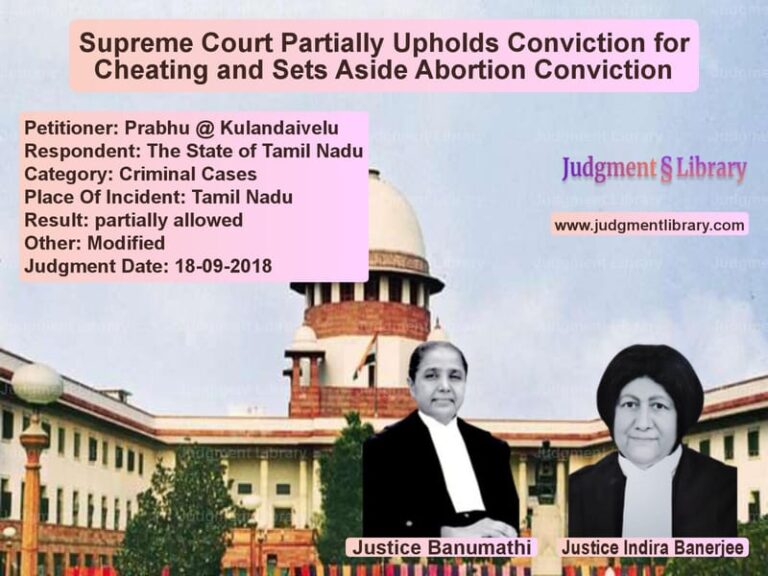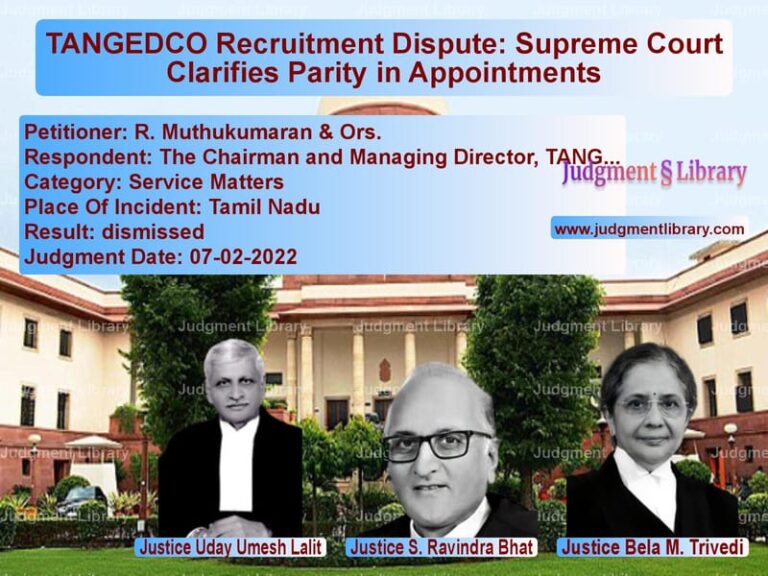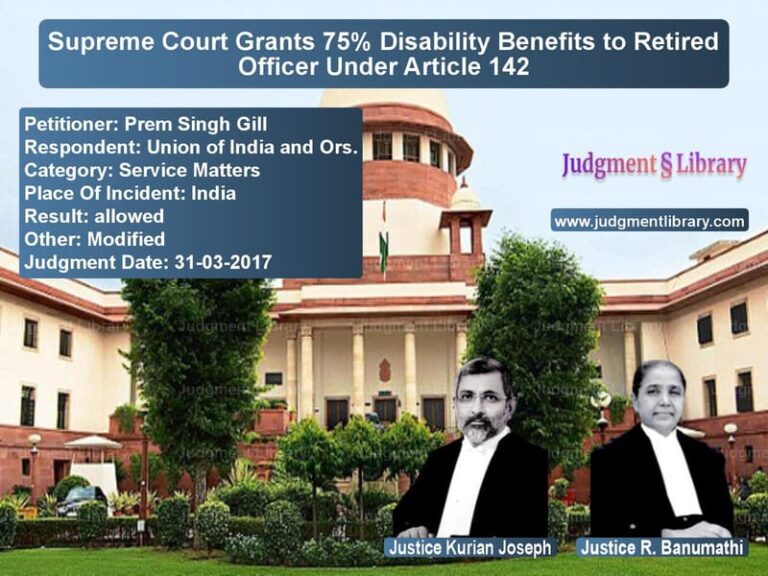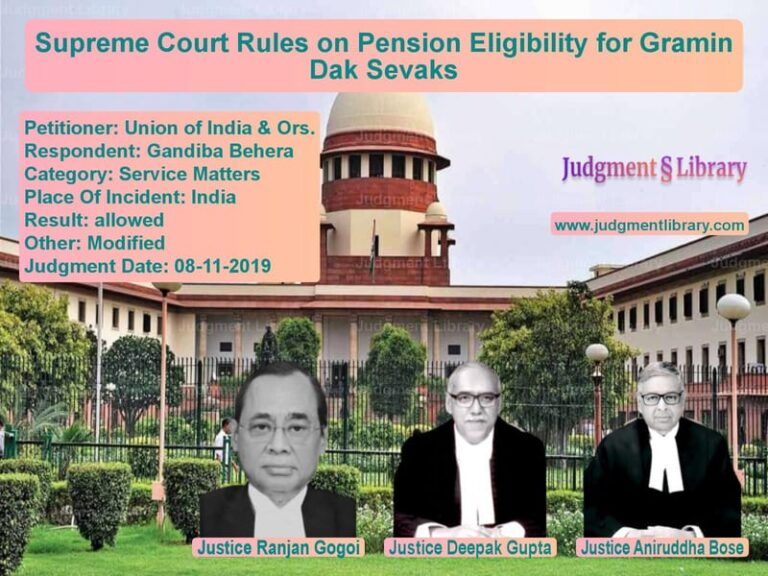Supreme Court Restores Trial in Lonavala Murder Case: High Court’s Discharge Order Overturned
The Supreme Court of India recently delivered a significant ruling in the case of Captain Manjit Singh Virdi (Retd.) vs. Hussain Mohammed Shattaf & Others. The case stemmed from the brutal murder of Manmohan Singh Sukhdev Singh Virdi in Lonavala, Maharashtra, in 2006. The prime accused, Hussain Mohammed Shattaf and his wife Waheeda Hussain Shattaf, were discharged by the Bombay High Court in 2013, leading to an appeal in the Supreme Court. The apex court has now set aside the High Court’s discharge order, allowing the trial to proceed.
Background of the Case
On May 14, 2006, Manmohan Singh Sukhdev Singh Virdi was found murdered in his bungalow in Lonavala. The investigation revealed that he had been in a close relationship with Waheeda Hussain Shattaf, the wife of the prime accused, Hussain Mohammed Shattaf. The prosecution alleged that upon discovering this relationship, Hussain conspired to eliminate Manmohan with the help of his wife and another accused, Zaanish Khan.
The chargesheet, filed on December 9, 2009, included statements from several witnesses and forensic evidence, including psychological profiling, polygraph tests, and Brain Electrical Oscillations Signature Profiling (BEOS) of the accused.
Arguments by the Petitioner
Captain Manjit Singh Virdi, the brother of the deceased, challenged the Bombay High Court’s decision to discharge the accused. His counsel argued:
- The High Court exceeded its jurisdiction by conducting a mini-trial at the discharge stage.
- The court ignored crucial forensic evidence, including BEOS profiling, which indicated the accused’s involvement.
- The High Court selectively considered witness statements, omitting key evidence collected by the investigating agency.
- The discharge order was premature, as a prima facie case had been established, warranting a full trial.
Arguments by the Respondents
On the other hand, the accused, Hussain and Waheeda, argued:
- The case was based purely on circumstantial evidence.
- There was no direct eyewitness linking them to the crime.
- They had been falsely implicated due to their proximity to the deceased.
- The High Court correctly evaluated the available evidence and found no material to proceed with the trial.
Key Observations by the Supreme Court
1. High Court’s Premature Discharge Order
The Supreme Court criticized the Bombay High Court for prematurely discharging the accused without proper examination of the entire evidence. The Court observed:
“At the stage of charge, the court has to satisfy itself that a prima facie case is made out. The High Court, by selectively considering evidence, has exceeded its jurisdiction.”
2. Significance of Psychological Evidence
The Supreme Court emphasized the importance of forensic tools such as BEOS profiling, stating:
“Psychological evaluation, including polygraph tests, may not be sufficient to convict an accused, but it is certainly a material piece of evidence that cannot be ignored at the charge stage.”
3. Role of Witness Statements
The Court pointed out that the High Court had overlooked critical witness statements, selectively relying on those favoring the accused. The judgment noted:
“Statements recorded under Sections 161 and 164 Cr.P.C. must be evaluated in their entirety. The High Court erred in disregarding statements that pointed towards the accused.”
4. The Importance of Allowing a Full Trial
The Supreme Court reiterated that a trial court must only discharge an accused if no case is made out, stating:
“Truthfulness, sufficiency, and acceptability of material can only be determined at trial. The accused must face trial unless there is strong reason to believe the case is fabricated.”
Conclusion
The Supreme Court’s decision reinstates the trial against the accused in the Lonavala murder case. The ruling reinforces the principle that courts must not conduct a mini-trial at the discharge stage and must allow a full-fledged trial when there is prima facie evidence. With this verdict, the case will now proceed in the trial court, bringing renewed hope for justice for the victim and his family.
Petitioner Name: Captain Manjit Singh Virdi (Retd.).Respondent Name: Hussain Mohammed Shattaf & Others.Judgment By: Justice Abhay S. Oka, Justice Rajesh Bindal.Place Of Incident: Lonavala, Maharashtra.Judgment Date: 18-05-2023.
Don’t miss out on the full details! Download the complete judgment in PDF format below and gain valuable insights instantly!
Download Judgment: captain-manjit-singh-vs-hussain-mohammed-sha-supreme-court-of-india-judgment-dated-18-05-2023.pdf
Directly Download Judgment: Directly download this Judgment
See all petitions in Murder Cases
See all petitions in Bail and Anticipatory Bail
See all petitions in Custodial Deaths and Police Misconduct
See all petitions in Judgment by Abhay S. Oka
See all petitions in Judgment by Rajesh Bindal
See all petitions in allowed
See all petitions in Quashed
See all petitions in supreme court of India judgments May 2023
See all petitions in 2023 judgments
See all posts in Criminal Cases Category
See all allowed petitions in Criminal Cases Category
See all Dismissed petitions in Criminal Cases Category
See all partially allowed petitions in Criminal Cases Category







